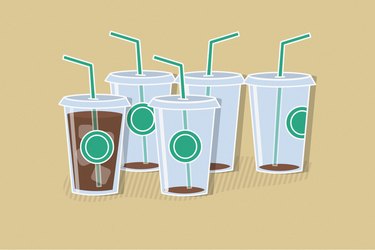
If there's one thing social media loves, it's a new diet trend. We're in the age of Ozempic, after all, and many people are looking for a quick fix when it comes to their weight. Bonus points if it involves a free pass to basically drink all the coffee.
That may be why the coffee loophole diet has skyrocketed in popularity lately. If you've caught the buzz around this viral weight-loss trend, you're likely wondering what it's all about and, of course, whether it actually works.
Video of the Day
Video of the Day
Here, Sophie Lauver, RD, LDN, a registered dietitian, national board-certified health and wellness coach and medical advisor at Aeroflow Diabetes, breaks down what you should know before hopping on the bandwagon.
What Is the Coffee Loophole Diet, Exactly?
In a nutshell, the coffee loophole diet is billed as a way to hack your hunger cues. And the premise is pretty simple: Social media users claim drinking coffee infused with certain supplements within seven seconds of feeling hungry can help you eat less without feeling deprived, thus helping you lose weight.
The diet is a version of the more established coffee diet but is unique in its addition of supplements and emphasis on drinking java within a certain timeframe.
The "rules" of the diet and the specific supplement add-ins vary a bit based on who is touting the eating plan. Overall, though, proponents tend to stress coffee's metabolism-boosting and appetite-suppressing properties.
Like most trendy diets, there's a sliver of truth behind these claims, but they're mostly overblown. More on that in a minute.
Which Ingredients Are Part of the Diet?
The coffee loophole diet recommends adding one or more of the following supplements to your mug of black coffee:
- Capsaicin
- Chromium
- Cinnamon
- Cayenne pepper
- Green tea extract
- Honey
- Lemon
Research connects some of these ingredients to weight loss, but in each case, the evidence is very limited at best.
There are a lot of claims about the benefits of chromium (sometimes called chromium picolinate), for example, which can mostly be traced back to a June 2013 review in Obesity Reviews that linked the supplement to weight loss. But even the authors of that study note that the effect on weight was small. And what's more, a November 2013 meta-analysis in the Cochrane Database of Systematic Reviews found "no current, reliable evidence" that chromium is effective for weight loss. So there's no clear consensus here.
Similarly, there's some evidence that cayenne pepper may stimulate metabolism and aid fat-burning in the body, per the Cleveland Clinic, but there's no proven link that either cayenne pepper or capsaicin (the compound that gives the pepper its spicy flavor) can lead to meaningful weight loss.
So, Does This Diet Really Work for Weight Loss?
The short answer: It might, but it's not a healthy approach, nor is it likely to lead to long-term weight loss.
Black coffee has zero calories, and there's some research to support that the caffeine in coffee is good for weight loss because it may help tamp down appetite and stimulate metabolism. In fact, in a six-month trial, adults with overweight who drank four cups of coffee a day lost about 4 percent of their body fat, according to a February 2020 study in the American Journal of Clinical Nutrition.
A little coffee before a workout can also increase your energy and help you power through the exercise, helping you burn more calories.
But here's the thing: "The coffee loophole diet can set false expectations and promote the unsuccessful idea that weight loss can be achieved in a vacuum by practicing a one-off habit," Lauver says. "In reality, weight loss is achieved through a system of sustainable daily habits practiced consistently relating to someone's nutrition, movement and overall healthy living approach."
The diet is also unrealistic, she says, especially the part about responding to your hunger cues within seven seconds. That's an awfully short timeframe that doesn't leave much wiggle room for the moments in your life when you're not a step away from the coffee pot.
Risks of the Coffee Loophole Diet
Lauver has a lot of concerns about this diet. First: "This diet fights against following your hunger cues, compromising the relationship people can have with themselves and their bodies. It promotes the idea that feeling hungry is something to feel bad about and should be stopped," she says.
The pressure to respond to your hunger cues more or less instantaneously can also create a lot of stress that just makes weight loss harder. "It's important to take time to consider the type of hunger you're feeling and how you'd like to address this feeling," she says. "Choosing one drink all the time will leave us unsatisfied and burnt out, reverting to old habits."
The diet can also be risky for people with certain health conditions because of its potentially high amount of caffeine, addition of supplements and emphasis on a zero-calorie beverage over nutritious foods. Lauver warns people with diabetes in particular to steer clear.
"With diabetes, it's especially important to eat regularly to provide consistent nourishment for your body and avoid hypoglycemia and hyperglycemia," she says. "While cinnamon or chromium supplementation could be beneficial, skipping meals and not honoring hunger cues can be dangerous for a person with diabetes."
Overall, Lauver says, drinking coffee with added spices or supplements in small amounts is likely perfectly fine for most people. But there's plenty of reasons to be cautious around this particular approach to weight loss. "The safety of this diet depends on the type of medications you're taking, your heart health, how much caffeine you're having (and what else you're putting in the drink), your relationship with food and the ways you're nourishing your body overall to prevent malnutrition," Lauver says.
Warning
Some supplements and medications pose an interaction risk, such as chromium and insulin, and green tea extract and blood pressure medication. Consult your health provider for guidance if you're taking any medication.
What to Do Instead for Healthy Weight Loss
Instead of relying on coffee to power through your hunger, Lauver recommends the following:
- Drink plenty of water: "Having plain water to drink when first feeling hungry can help to assess if you're truly feeling hungry or just thirsty," she notes. Water is also a zero-calorie beverage, by the way, and it helps you stay hydrated, which helps your body more effectively burn calories, per the Mayo Clinic.
- Spice up your food: "Adding cinnamon or cayenne spices to your food can provide the nutrition benefits of those ingredients while flavoring food and allowing for reduced sodium intake," she says.
- Honor your hunger cues: Don't skip meals, Lauver says. Eating regular meals and snacks actually supports a health metabolism, she notes. Just make sure you're reaching for nutrient-rich foods like fruits, veggies, whole grains and lean protein,
- Add strength-training: Cardio exercises (think: running, biking) may burn more calories in the moment, but resistance training helps you build lean muscle, which stimulates your metabolism, Lauver says. Having more muscle helps you burn more calories throughout the day, even when you're at rest.
The Bottom Line
The coffee loophole diet is a buzzy weight-loss trend on social media that involves drinking coffee mixed with certain supplements within just a few seconds of feeling a hunger pang. While it may help some people lose a little bit of weight, it's an unrealistic, unsustainable approach to weight loss that's best avoided, especially if you have underlying health conditions that could be worsened by lots of caffeine.
- Obesity Reviews: "Chromium supplementation in overweight and obesity: a systematic review and meta-analysis of randomized clinical trials"
- Cochrane Database of Systematic Reviews: "Chromium picolinate supplementation for overweight or obese adults"
- Cleveland Clinic: "Can Cayenne Pepper Speed Up Your Metabolism?"
- Harvard T.H. Chan School of Public Health: "Four cups of coffee a day associated with modest loss of body fat"
- Mayo Clinic: "Metabolism and weight loss: How you burn calories"
- American Journal of Clinical Nutrition: "The effect of coffee consumption on insulin sensitivity and other biological risk factors for type 2 diabetes: a randomized placebo-controlled trial"
Was this article helpful?
150 Characters Max
0/150
Thank you for sharing!
Thank you for your feedback!


